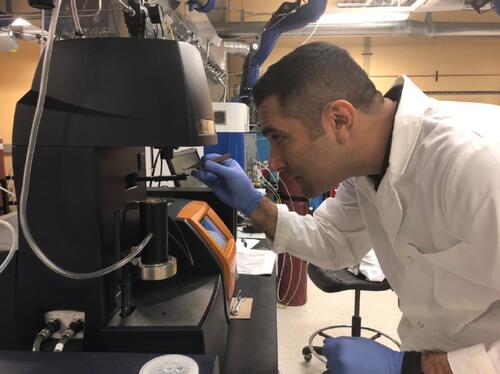
Postdoctoral fellowship helps advance water treatment research
Edris Madadian is developing technology to remove toxic chemicals from wastewater

Edris Madadian is developing technology to remove toxic chemicals from wastewater
By Carol Truemner Faculty of EngineeringBacked by a new postdoctoral program, a chemical engineering researcher will spend the next couple of years designing innovative technology to remove toxic chemicals from wastewater.
Edris Madadian is one of four across campus to receive funding from the AMTD Waterloo Global Talent Postdoctoral Fellowship established with a $3 million dollar donation from Calvin Choi (BA ’01), chairman of the board of AMTD Group. Each recipient will receive $75,000 annually for two years.
Madadian started his work at the beginning of last month as part of chemical engineering professor David Simakov’s research group located in Engineering 6.
Passionate about the environment and how it affects human health, he is applying advanced thermochemical and biochemical technologies to remove contaminants from sewage sludge, the main by-product from wastewater treatment plants.
Madadian describes wastewater treatment as work so extensive we can not even imagine what goes into it.
“Everything that is flushed down the toilet and is put down the drain goes on an epic journey,” he says. “Human waste is a major part of that, but you also have materials that humans use like wipes, diapers, condoms, masks, gloves, dental floss, even kids’ toys.”

Edris Madadian is advancing his work as a new postdoctoral researcher.
Madadian is particularly concerned about expired medications that are disposed of in a toilet adding toxic and hazardous chemicals to wastewater. Even after the water is treated, much of the toxicity could remain, he points out.
“The potential risks due to disposal of COVID-19 personal protective equipment as well as feces from infected humans must not be neglected even though no related cases have been reported so far,” he explains.
At the end of the treatment process, the sludge is either landfilled, recycled onto agricultural lands or, in some cases, incinerated, he says.
“The majority of the sludge is recycled through land applications with the rest transferred to the air,” says Madadian.
The postdoctoral researcher expects the outcome of his work will be beneficial for local municipalities as well as others throughout the world in preventing health issues caused by transmission of contaminants that have been secreted from the liquid portion of wastewater.
The technology he is developing has the potential to not only detoxify resulting wastewater sludge but produce a renewable source of fuel from the organic content of the solids.
Engineering family ties
Madadian’s interest in engineering is part of his DNA — his grandfather, father, brother and sister-in-law are all engineers working in Europe.
Growing up in Iran, Madadian completed his undergraduate degree at Shomal University and his master's at the University of Tehran. He then came to Canada where he graduated with a PhD in bioresource engineering from McGill University in 2018. A Killam Postdoctoral Research Fellow at Dalhousie University for two years, he was most recently a postdoctoral researcher at University of British Columbia.
The author of 40 refereed publications, his work has primarily focused on renewable energy systems and sustainable engineering for a wide range of applications including agricultural, oil and gas, and automotive industries.
Madadian joins Waterloo Engineering with an outstanding teaching record, having taught graduate seminars in his area of expertise, as well as multiple courses in mathematics at all undergraduate levels.
He is grateful for the opportunity to advance his research with the help of the new postdoctoral fellowship and the University's "amazing" facilities and connections.
“I’m happy for the invaluable experience I’m receiving at the University of Waterloo and all the opportunities it offers including engaging with industry,” he says.

Read more
Here are the people and events behind some of this year’s most compelling Waterloo stories

Read more
Meet five exceptional Waterloo graduate students crossing the convocation stage as Class of 2025 valedictorians

Read more
Twenty-six researchers receive federal funding to drive discovery, innovation and research infrastructure development
The University of Waterloo acknowledges that much of our work takes place on the traditional territory of the Neutral, Anishinaabeg, and Haudenosaunee peoples. Our main campus is situated on the Haldimand Tract, the land granted to the Six Nations that includes six miles on each side of the Grand River. Our active work toward reconciliation takes place across our campuses through research, learning, teaching, and community building, and is co-ordinated within the Office of Indigenous Relations.